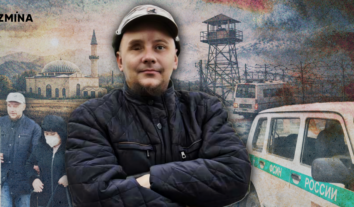Dmytro and Olena from Kupyansk imprisoned for sending SBU pictures of Russian equipment: Couple tells how they waited for town liberation in captivity
During the occupation of Kupyansk, 30-year-old local resident Dmytro Hrechanyi was taking photos and recording videos of the movement of Russian military equipment and sending them along with geolocation marks to the Security Service of Ukraine (SBU). In early August, Dmytro and his girlfriend Olena [name is changed] were summoned to the police station for questioning: they were asked whether they cooperated with the Ukrainian special services. During the interrogation, the occupiers made a backup copy of the man’s phone and found previously deleted pictures of military equipment. Both of them were imprisoned and held separately.
Dmytro saw the release of Kupyansk by the Armed Forces of Ukraine in the hospital, and Olena – in a detention center of the police station, from where she and other prisoners managed to get out on the day the Russians fled the town.
Dmytro and Olena told ZMINA about life in Kupyansk under the occupation, the raids of the Angels of Death and the abduction of local residents, the overcrowded cells of detention center and the occupiers’ treatment of imprisoned men and women, as well as their release.
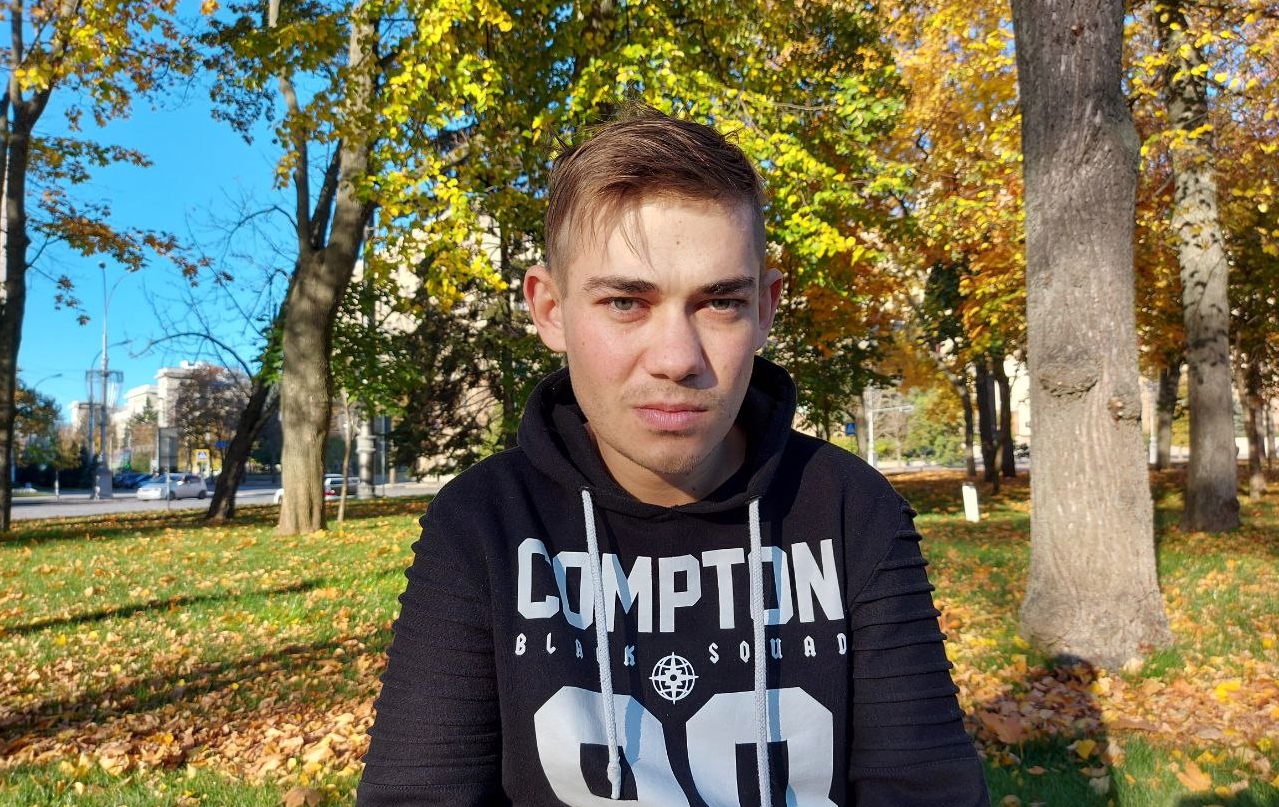 Dmytro Hrechanyi
Dmytro HrechanyiBefore the start of the full-scale invasion, Dmytro Hrechanyi earned money repairing computers and writing music for his solo project. When Russian troops entered Kupyansk on February 27, the man began recording the movement of military equipment of the occupiers by his phone: a highway towards Kharkiv and Izyum and military convoys moving along it were seen from the windows of his apartment in a nine-story building on the outskirts of the town. Dmytro sent photos, videos and geolocation marks of equipment via WhatsApp to SBU officer from Kharkiv, whom he knew before the occupation, deleting everything from his phone afterward.
In April, mobile communication was cut off in Kupyansk. Sometimes Dmytro and his girlfriend Olena, who lived together, managed to get Internet connection by going to the ninth floor of their house. Other townspeople went to the gardens nearby where local men used self-made antennas to connect to the Internet and distribute Wi-Fi on one of the hills. One could get the Internet for 20 minutes paying 50 hryvnias. The Russian military also came and received the Internet free of charge.
Dmytro rarely left his apartment, just to walk a dog or go to a store. During one of such walks, he witnessed the abduction of a local resident by the Russian military.
“I saw how a man was taken from his car. He was sitting inside when a Russian car marked with “Z” drove up. Armed soldiers came out and dragged the man outside. They put a bag over his head and threw him in their car, one of the soldiers got into the car of the kidnapped man, after which they all drove off together.”
‘Angels of Death came for you’
At the end of June, when Dmytro and Olena were at home with their friend Roman, somebody knocked at their apartment door. It was around 22:00, the curfew. Dmytro opened the door and saw five armed soldiers wearing balaclavas. They asked the man’s name and surname and stepped inside.
“As far as I understood, it was the Russian Guard. They began searching the apartment, checking laptops and phones, asking about camouflage clothing and Ukrainian symbols. I was interrogated in a separate room, and Olena and Roman were questioned in the kitchen. They asked about the local military, who is fighting where, whether I cooperate with the Ukrainian special services, whether I transfer data to them or not,” Dmytro says.
The search and interrogation lasted about an hour, Dmytro felt bad at some point:
“During the interrogation, I began to stutter and at one point clutched at my heart. They ask: ‘What’s the matter with you?’ I replied that armed men had never come to me at ten o’clock in the evening. I told them about my poor health, that I have diabetes, and injected myself with insulin in their presence.”
Having finished the interrogations, the Russians left, ordering Dmytro to clean up the apartment: “Scrub everything here, we’ll come back and check.”
The soldiers did not come to the apartments of other residents: the man saw from the window that they drove away in a gray and white jeep marked with “Z” immediately after visiting him. Dmytro assumes that the military could visit him because other locals could tell them during interrogations that he had expressed his pro-Ukrainian views in their presence.
The next day, the man wrote about the visit of the Russians to SBU officer whom he informed about Russian equipment. The officer replied that he knew about the activities of that unit:
“They are called the Angels of Death. Don’t worry, they come only once. If they don’t find anything, then you become uninteresting to them.”
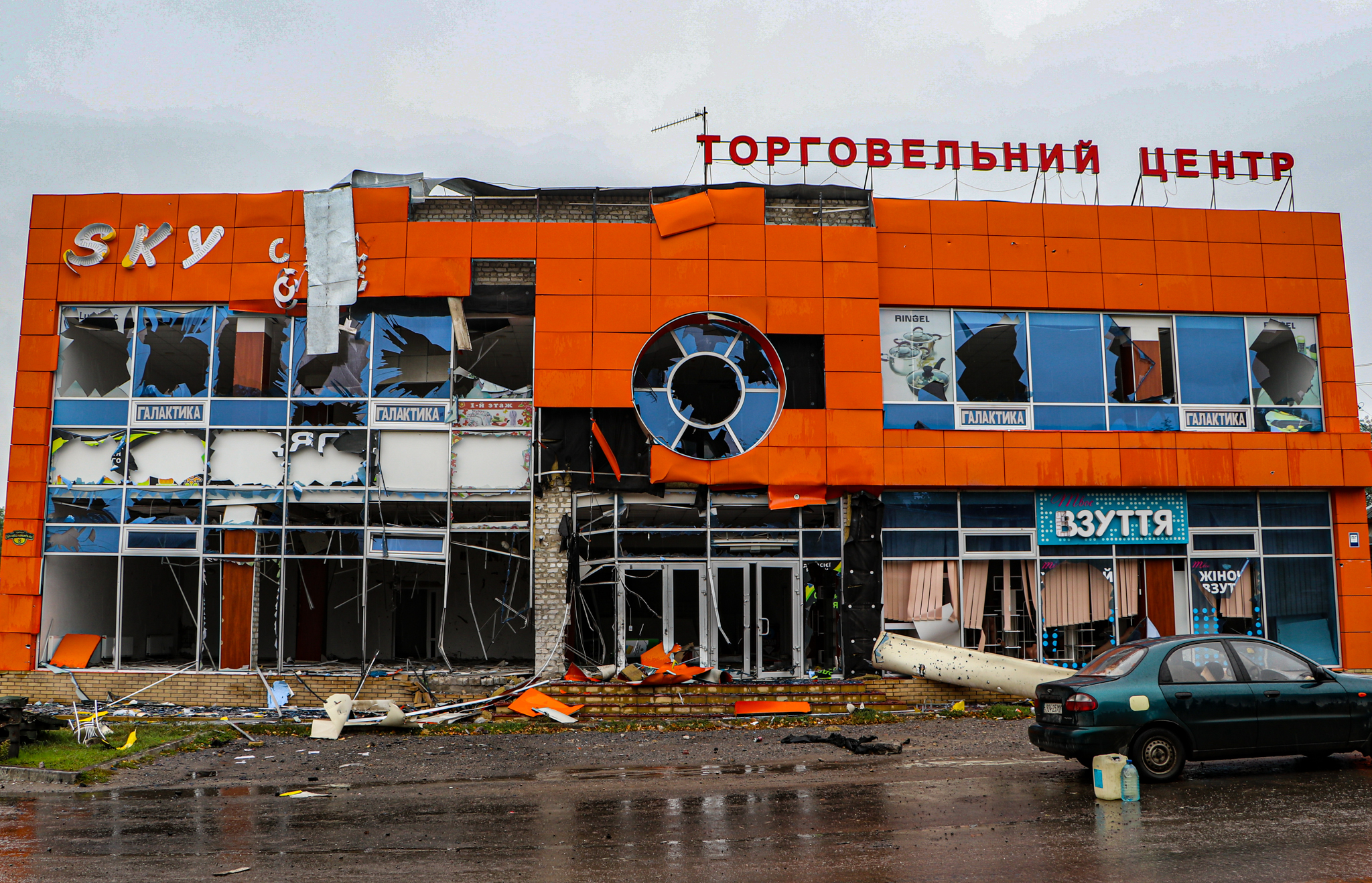 Shopping mall in Kupyansk. Photo credit: Serhiy Kochmarsky / ZMINA
Shopping mall in Kupyansk. Photo credit: Serhiy Kochmarsky / ZMINAA week after the search, Dmytro, Olena, and Roman went to buy groceries in the town.
“We left the store and were about to get into the car when suddenly heard a voice behind: ‘Well, how are you doing there, have you cleaned up?’ It was a military man with companions in balaclavas. I told him that I cleaned. Then he said: ‘Well, we’ll come back to you and check!” Dmytro describes the meeting.
“Well, lovebirds, it’s over for you!”
At the end of July, Dmytro and Olena were trying to connect to the Internet on the ninth floor of their house when they saw a green VAZ Patriot car marked with “Z” pulling up to their driveway. Since it was already curfew, they quickly went down to their apartment and in a few minutes heard a rumble from the lower floors demanding to open the door. Ten minutes later, somebody knocked thrice on their door. That was a signal that “a friend” came. A neighbor stood in the doorway in tears. She said that “Artem was taken away.” Artem once participated in the anti-terrorist operation in eastern Ukraine.
The next day, military patrols began to drive more actively across the neighborhood where Dmytro and Olena lived. On the same day, the occupiers closed the Kupyansk meat processing plant and all its stores in the town. The couple decided that it would be safer to move out of the apartment and live with relatives for a while.
When Dmytro returned to the apartment a day later to pick up some things, there was no electricity: someone had turned off a switchboard. He turned it on because there was some food left in the fridge. But the next day, the situation happened again: when he arrived, the switchboard was turned off again. Dmytro talked to a neighbor, and she said that people in uniforms came, banged on the door, turned off the electricity, asked the neighbors: “Where is the young couple?“
“Perhaps, Artem could tell something about us. Before he was taken away, he had been nervous, scared, saying that Russia would be here forever, and we were going down,” Dmytro suggests.
After that, the man went to his mother and agreed that she would spend the night in his apartment and talk to the military in case of their visit. They arrived and told his mother that someone was transporting drugs around the town on a blue motorcycle, and since Dmytro also had a blue motorcycle, they wanted to talk to him. They asked her to tell her son to come to the police station.
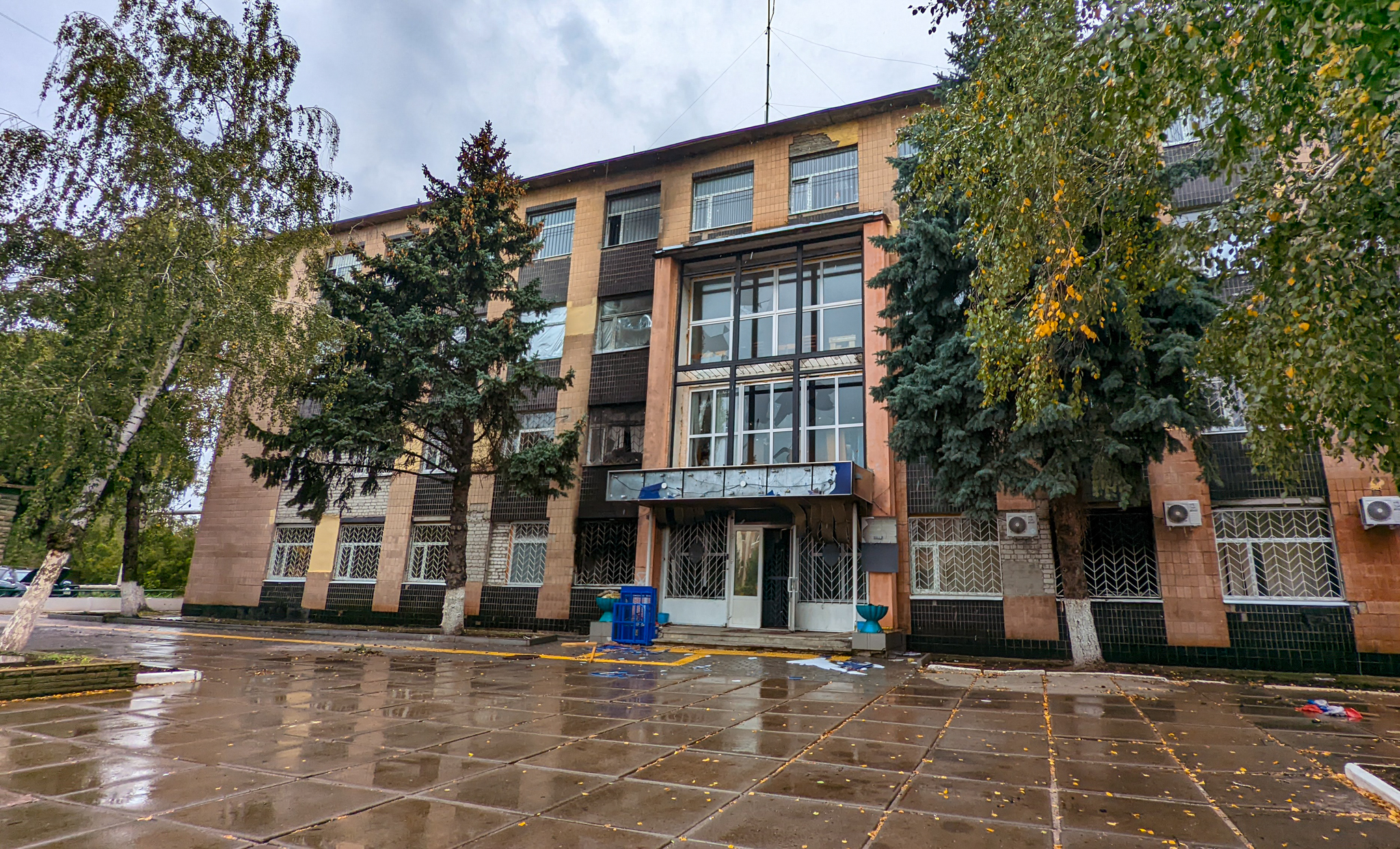 Kupyansk police station. Photo credit: Yevhen Vasylyev / ZMINA
Kupyansk police station. Photo credit: Yevhen Vasylyev / ZMINAOn July 31, Dmytro came to the police station.
“One of the investigators’ name was Sasha Kot, he was from Novosibirsk. There was also another investigator, a stocky man with a mole on his cheek, his name was Dmytro Eduardovych, and his call sign was Dozor 7.1. They were talking to someone on walkie-talkies in my presence, that’s how I found out about their callsigns,” the man explains.
The investigators asked Dmytro why, in his opinion, they were looking for him. Dmytro assumed that it was because of the motorcycle, but that was not what the investigators were interested in: “You have to think about it, think better. Maybe you are somehow connected with the special services? We have been told a lot about you, and we already know about you more than you are willing to tell.”
During the interrogation, the investigators checked Dmytro’s phone for a long time and found hidden messengers in it, but there was nothing in them. However, they partially restored the backup copy of the phone, which Dmytro did not even know about. One of his photos of the Kupyansk Bridge and various photos from Telegram channels were found there.
Dmytro was taken home to seize his laptop. They promised to return it in a few days if they did not find anything compromising there.
On August 4, Dmytro came to the police station to pick up his laptop. He was called to the office for questioning and was told: “You did something mean.” The investigators found the photos of Russian military equipment he had taken and began to ask what kind of photos they were:
“They started to hit me in the face with a large briefcase with documents, causing my blood pressure to rise and my head to ache. Since I didn’t confess anything to them, they decided: ‘Let’s take him to detention center’.”
On the same day, the investigators summoned Olena for questioning and asked how exactly her boyfriend sent the data to the special services. The investigators had the information that the woman received a money transfer of 30,000 hryvnias during the occupation. Olena explained that the money was one-time assistance from the company she worked for. But the investigators refused to believe that any company could pay such assistance to its employees and insisted that she had received the money from the Ukrainian special services for the data provided by her boyfriend. At the end of the interrogation, an investigator said:
“Well, lovebirds, it’s over for you! We will lock you both up, but you will sit separately.”
“I thought I would be tortured.” Dmytro’s story
Dmytro was placed in solitary confinement, where two other men – Yuriy and Yevhen – were held. The first one, the man says, was “a well-known hard-core criminal in Kupyansk”, he was 62 years old. He claimed that he did not know what he was imprisoned for. Yevhen was about 30 years old, he lived in a town nearby, Kupyansk-Vuzlovyi. He said he was imprisoned because someone ratted that he was stealing something.
The guards ordered that now only Dmytro must sleep on the bed, and the others must sleep on the floor. The next morning, they went into the cell and saw that Yuriy was lying on the bed. He was beaten so harshly for that that he fell, and was ordered to sleep on the floor from now on. Dmytro assumes that the bed could have been given to him because of his poor health.
Yevhen was taken for questioning that day where he was told that the man who accused him of theft was actually a thief himself and ordered to go home. He spent 22 days in prison.
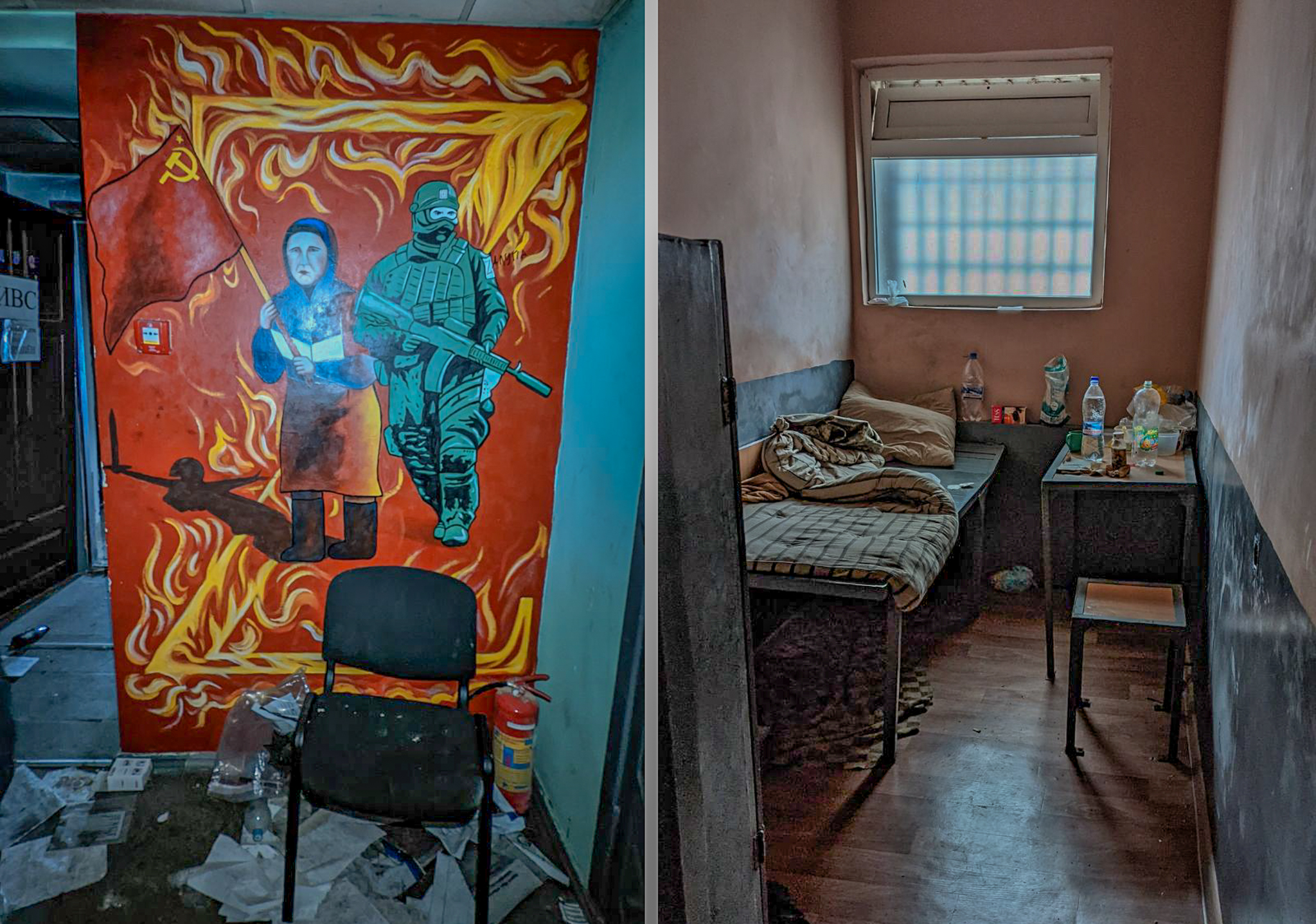 Photo credit: Yevhen Vasylyev / ZMINA
Photo credit: Yevhen Vasylyev / ZMINADmytro was also taken for questioning that day and asked what his call sign was, why he was taking pictures, who he was talking to: “If you took pictures, then you definitely passed them on to someone.” They said that they would completely restore the backup copy of his phone in a few days and find out everything about him.
The prisoners were fed twice a day with pasta, some kind of porridge, and occasionally stew. Dmytro heard from his cell other detainees being tortured:
“I heard one evening someone screaming as if a person was being cut. He was asked: ‘why are you sreaming?’ And he moaned and shouted that it hurt much. I thought that I was about to be tortured. But I wasn’t for some reason.”
On Saturday, on the third day of detention, Dmytro felt ill. He checked his blood sugar level: it rose to 17. When dinner was brought to the cell, the man went to the door to take it, took a plate from a “feeder”, turned around, and then collapsed. His cellmate Yuriy called the guards.
Dmytro was taken outside, where he felt a little better. He was injected with five vials of saline and was ordered to inject himself with insulin, after which he was taken back to the cell.
The next day, Dmytro also felt ill, his blood pressure rose sharply. And already on Monday, the guards ordered him to pack his things to go to the hospital.
“When I was being taken out of the detention center, investigator Dmytro Eduardovych saw me and said: ‘I think you should be tortured with electric shocks so that you tell me everything.’ After these words, I almost broke into tears, my nervous system couldn’t endure it anymore. After looking at me, Dmytro Eduardovych said: ‘Okay, go to the hospital, stay there for a few days, and then we’ll pick you up, and you’ll tell us everything. And if you don’t tell, it will be worse for you.”
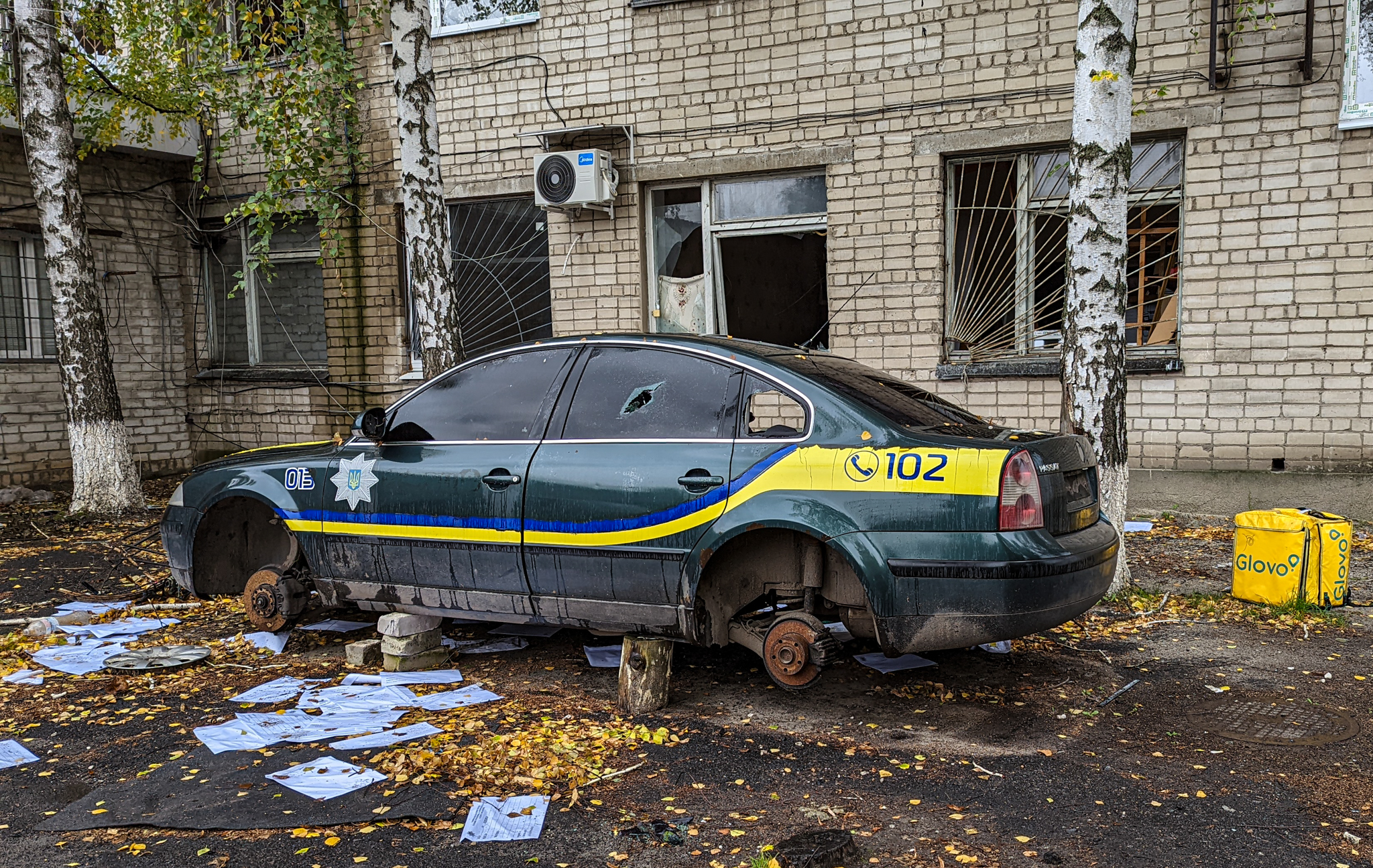 Photo credit: Yevhen Vasylyev / ZMINA
Photo credit: Yevhen Vasylyev / ZMINAOn August 9, Dmytro was taken to the Kupyansk Town Central Hospital. He was diagnosed with acute appendicitis and peritonitis: there was already pus, and the blood sugar level rose to 37. The doctors operated on him, placed a drain, and transferred the man to a guarded room. The man’s hand was handcuffed to the bed immediately after the operation.
Dmytro shared the room with Roman, a 47-year-old resident of Kupyansk. He told Dmytro that he had been beaten brutally by the Russians for saying “It was better in Ukraine.” The occupiers took the man from a car market, where he was selling spare parts, and started beating him – first in the car, and then continued at the police station.
According to Roman, he was beaten so badly that he could not get up. He was lying on the floor for 15-20 minutes. Then some people came into the office, put him on a chair and asked what happened and who beat him. After Roman’s explanations, they started cursing and yelling: “How so, right at the station!” Then he was taken to the hospital.
“Roman got seven ribs broken, lungs pierced, he had infiltrates all over his body – his kidneys and liver were damaged, all organs possible. The doctors told him: ‘If this had happened to you in peacetime, you would have been diagnosed with the second group of disability.’ When I was taken to the room, Roman had already been there for two months,” Dmytro recalls.
Three days after the surgery, Dmitry and Roman were transferred to a “special room” with barred windows. They were always guarded by three escorts who changed every three or four days. The escorts, according to Dmitry, treated him differently:
“Some sympathized, saying they had no choice. Others mocked: when I asked permission to go to the toilet, they told me to be patient. They could not let me in for an hour and a half, waiting for me to feel completely unbearable. They escorted me to the toilet with machine guns and did not leave for a moment.”
On some days, investigator Dmytro Eduardovych, who had interrogated Dmytro at the police station, came to the hospital to check the convoy. He “joked” and taunted the man, telling him to recover so he could take him back to the cell. And at the end of August, he began to scold the doctors: “Treat him faster, we really need him.”
At the beginning of September, Dmytro heard that hostilities were taking place in the town. On September 7, one of the guards approached him and said:
“We will get out of here today. We were ordered to lock you up here but we will do the right thing and leave the door open for you: when you are sure that we have all left the hospital, take your things and run home.”
At night, all the Russians left the hospital, having evacuated their wounded from the military hospital on the third floor. And in the morning, Dmytro’s mother came to the hospital and took him home.
“We will hand you over to soldiers and they will do whatever they want with you” Olena’s story
While Dmytro was in the detention center, and later in the hospital, Olena was held in the police station cell intended for two inmates, in which 10-11 other women were staying with her. Neither mattresses nor blankets were given to them, so most of the women slept on the bare floor.
“We were not allowed to take a shower. When we asked the guards about it, they pointed to a toilet bowl and said: ‘Take a bath here’,” Olena says.
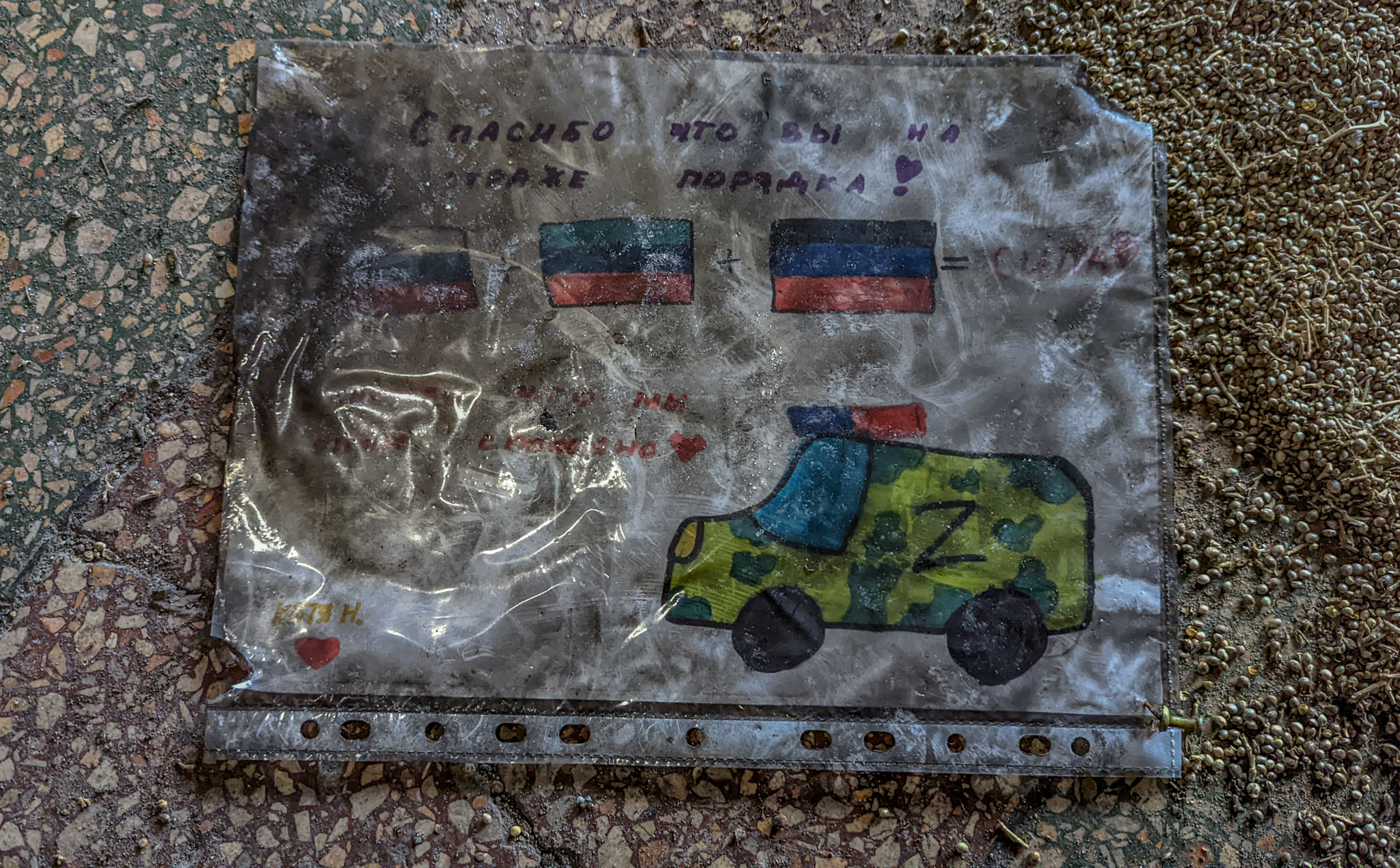 Photo credit: Yevhen Vasylyev / ZMINA
Photo credit: Yevhen Vasylyev / ZMINADuring the first two days of her imprisonment, the girl was summoned for questioning and asked the same questions about Dmytro and their “curators”. Olena remembers how during one of the interrogations the investigators did not like the answer and threatened to hand her over to the Russian soldiers so that they could “do whatever they want with her”.
After that, Olena was not summoned for questioning until, on the third week of detention, two guards entered her cell at 01:00, put a cap over her eyes, and took her to the courtyard of the detention center. They put a gun to the girl’s head and imitated shooting, threatened to torture her with electric shocks and take to the forest if she didn’t give any evidence. It lasted more than an hour, after which Olena was taken back to the cell, where the guards forced her and all the detained women to sing the Russian national anthem.
“We were forced to sing the Russian national anthem three or four times a day along with Katyusha and Smuglyanka-Moldovanka [Soviet songs of WWII]. That’s how they cheered themselves up. Sometimes they got drunk and started going around the cells, forcing everyone to sing, and if they didn’t like something, to sing over. Men who refused to learn the Russian national anthem were beaten,” Olena recalls.
The girl heard the sounds of torture and beating of prisoners almost every day:
“The sound was as if they were beaten with a tube. The men screamed very loudly. And when they picked up drunkards in the street and brought them to the police station, they took them out into the courtyard, handcuffed, and also beat them severely.”
Olena’s cellmates were also tortured with electric shocks and beaten. One of them, a 60-year-old school principal from Vovchansk district, spent five days in a solitary confinement cell, where she was periodically beaten and not fed. Another woman, 47, was from Luhansk region. The Russians detained her at a checkpoint and found out that her daughter once worked in the Security Service of Ukraine. This woman told her cellmates that she was tortured with electric shocks four or five times. It hurt so much that the woman had bowel and bladder incontinence.
An 18-year-old girl, who was put in the women’s cell at the end of August, was also tortured with electric shocks. According to Olena, she had numerous bruises on her calves, ribs, and back. The girl was tortured because “her boyfriend supported Ukraine.”
Olena also spoke about women with cancer kept in a solitary confinement cell:
“Two more women had cancer. One of them, Yulia, who was about 45 years old, had thyroid cancer and had been in prison for three months. Yulia has been volunteering since 2015, but she was detained because they found photos of Russian equipment in her phone. When she asked investigator Dmytro Eduardovych to send her to the hospital, he only smiled and said: ‘So what about cancer? If you don’t want to cooperate with us, then sit here.”
Another woman, according to Olena, had gynecologic cancer and the process of rotting had already begun. Once, a military officer looked into the cell and asked why one of the women was lying on the floor and did not get up at his command. He was told that she had cancer and was very sick. In response, the soldier drew attention to the fact that the cell was too crowded and promised to resettle them. A week later, some of the women were moved to another separate cell.
 Photo credit: Yevhen Vasylyev / ZMINA
Photo credit: Yevhen Vasylyev / ZMINAOn September 7, the day the Russian troops left Kupyansk, the prisoners were not fed in the morning, even the “feeders”, which had always been open until then, were closed. According to Olena, around 15:00-16:00, all the Russians left the police station, leaving the cells closed. By the night, the men locked up in one of the cells managed to break the bars on the window and get out into the street. They broke down the entrance door, found the keys to the cells, and began to free the others.
“At two o’clock in the morning we were all released, there were about two hundred of us. People said that our mayor Matsehor, a traitor, had been in the cell from which the people got out first. He collaborated with the Russians and was later imprisoned by them. But when I left the cell, I did not see him. Maybe he was the first to run away,” Olena recalls.
Like others released, the woman started to look for her documents and phone around the building but did not find anything. However, she met her friend Roman among the other freed people. He told her that investigator Sasha Kot together with the military had come to his workplace on August 25. The Russians took Roman to police station, interrogated him, demanding to confess what he knew about Dmytro, Olena, and their curators, putting cigarette butts out against his body. In the end, he was taken to the detention center and was not called for further questioning.
Olena and Roman left the police station and walked through the night city to Dmytro’s apartment, arriving home at dawn.
***
On September 8, battles were still going on in Kupyansk. The Russians gained a foothold at a sugar factory on the left bank of the town and from there shelled the right bank, where the Armed Forces of Ukraine were stationed. Due to heavy shelling, Olena and her father decided to evacuate and, since, according to their information, the bridges to the government-controlled territory had been destroyed, they went to Estonia through the territory of Russia and then moved to Germany.
Dmytro stayed in Kupyansk for another two weeks after his release from the hospital and then left for Kharkiv together with his mother. The man was admitted to a hospital and is currently undergoing treatment and applying for disability benefits:
“The wound after the surgery has not yet healed, there is suppuration. I have bad diabetes symptoms, problems with kidneys, the pressure keeps rising. These are consequences of stress and everything I went through.”


